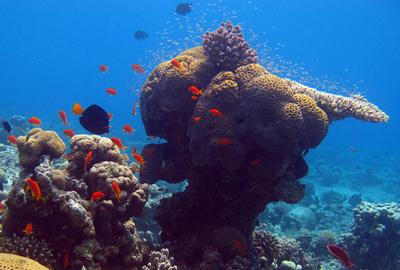Unique New Module for 2018. Understanding Coral Reefs.

A new module, unique to the University of Southampton will offer students a comprehensive introduction to coral reefs. This fascinating module from Ocean & Earth Science will give students an insight into how coral reefs function and how the symbiotic corals cope with the effects of climate change. It will allow students to contribute to the conversations about coral reef future happening now at Southampton, a world-leader in coral reef research.
Key features of the new module are:
- Share the experience of active coral reef researchers.
- Learn about coral reefs of the past, present and future.
- Understand the interdependence of humans and reefs.
- Discuss coral reef management strategies.
- Identify major groups of corals in hands-on exercises.
- Gain practical skills and software knowledge required for reef habitat mapping.
The module will focus on tropical coral reefs, benthic marine habitats created by the habitat-founding species, most important, by calcifying organisms such as scleractinian corals. Through dedicated lectures and practical work students will develop skills in identifying major reef building corals and understand how they interact with other species to form coral reefs. They will examine how oceanographic conditions, the complex nutrient cycling processes and the symbiotic associations make coral reefs hot spots of primary production in otherwise oligotrophic oceans, the basis of the longstanding Darwin Paradox.
Students will value the ecosystem services offered by coral reefs such as coastline protection, sheltering of other important ecosystems such as seagrass beds and mangroves, sustaining fisheries, ornamental trade and tourism, and being a source for biopharmaceuticals. Using research-led examples, emphasis will be placed on the in-depth study of the physiology of corals and their symbionts, providing the knowledge basis that is required to understand the responses of reef organisms to their environment, and their capacity to adapt to different reef habitats and geographical regions.
Students will assess how coral reefs are threatened at the local scale by overfishing, destructive coastal development and eutrophication and how climate change imposes stress on coral reefs at the global scale, exposing them to ocean warming and acidification. The students will integrate and apply the knowledge acquired during the course to evaluate how temperature, light and nutrient stress can lead to a breakdown of the vital symbiosis between the corals and their algal partners that manifests as coral bleaching. They will analyse the potential consequences of coral bleaching such as coral disease outbreaks, die-offs and ecosystem phase-shifts that can lead to loss of ecosystem functioning.
Finally, we will welcome guest speakers to present case studies to discuss the breath of coral reef–related research at the University of Southampton and collaborating institutes. Planned topics include coastal management practices, artificial reefs, climate change and sea level rise and the use of coral skeletons as archives for past climate conditions and historical reef ecology.
Aims of “Understanding Coral Reefs”
1) To introduce students to the central concepts that underlie the functioning of coral organisms and reef ecosystems
2) To recognise the physiological and ecological mechanisms that underpin the adaptation of corals and reef communities to specific and changing environmental conditions
3) To understand the value of coral reefs in providing ecosystem services to human societies and the threats that anthropogenic impacts impose on reefs and their capacity to deliver these services
4) To evaluate opportunities for knowledge-based coral reef conservation strategies and influencing policy makers
The module will be available in 2018 for Year three students of MSci Marine Biology, MSci Biology and Marine Biology and the BSc Marine Biology and Oceanography degree programmes.
For news, follow @TheCoralReefLab